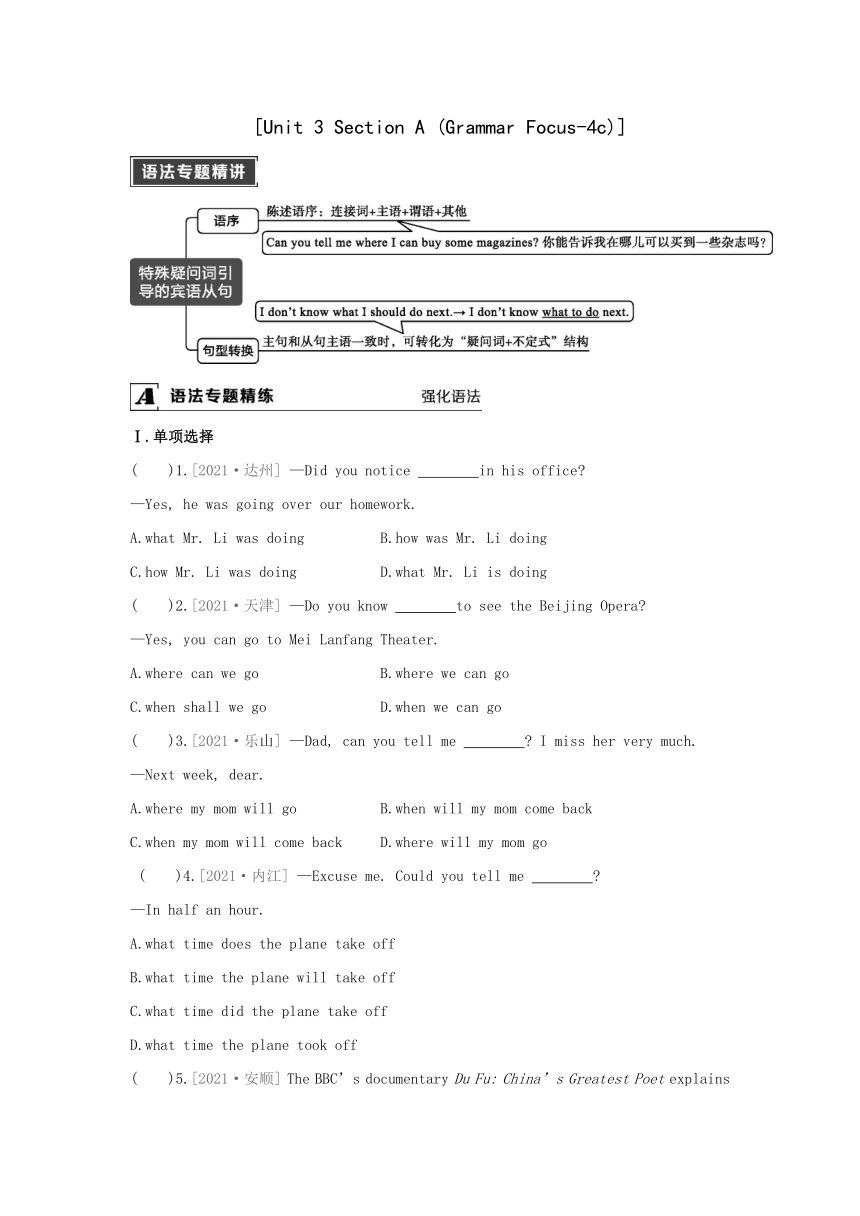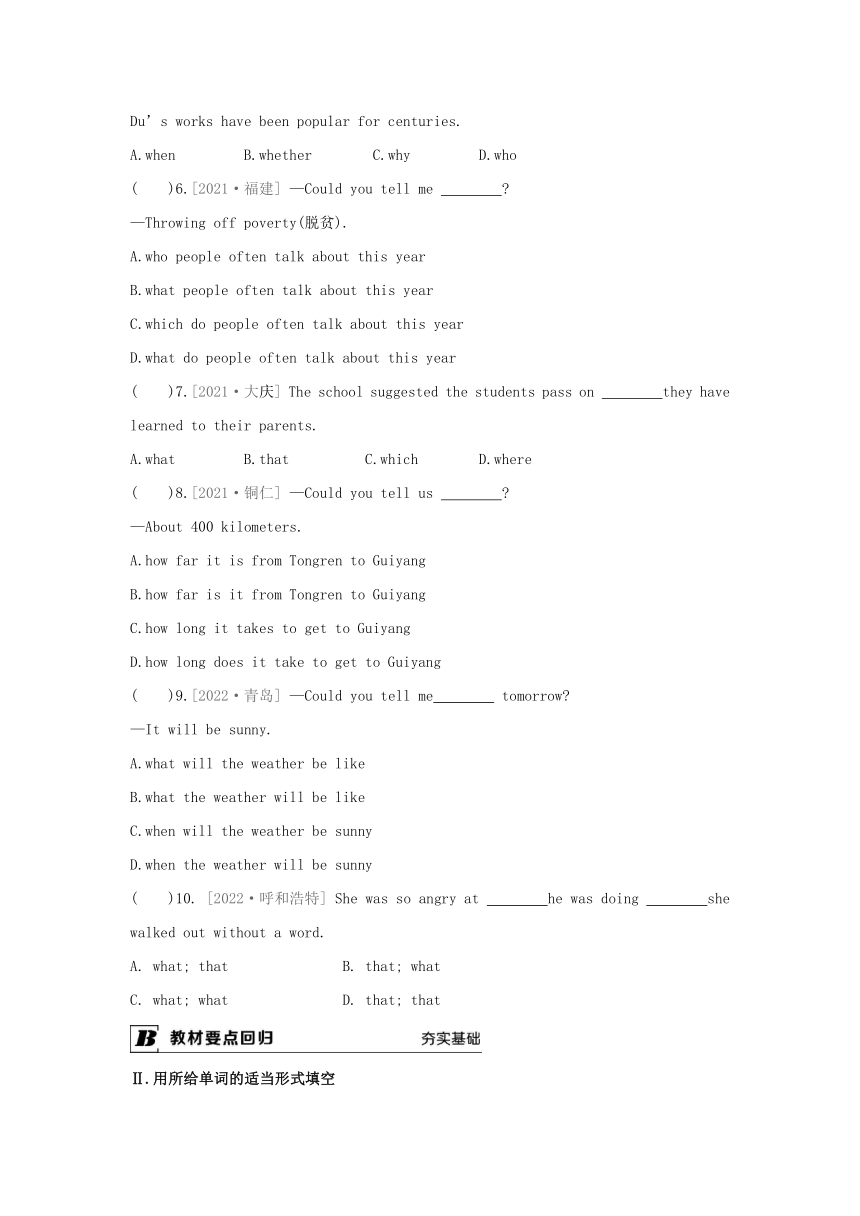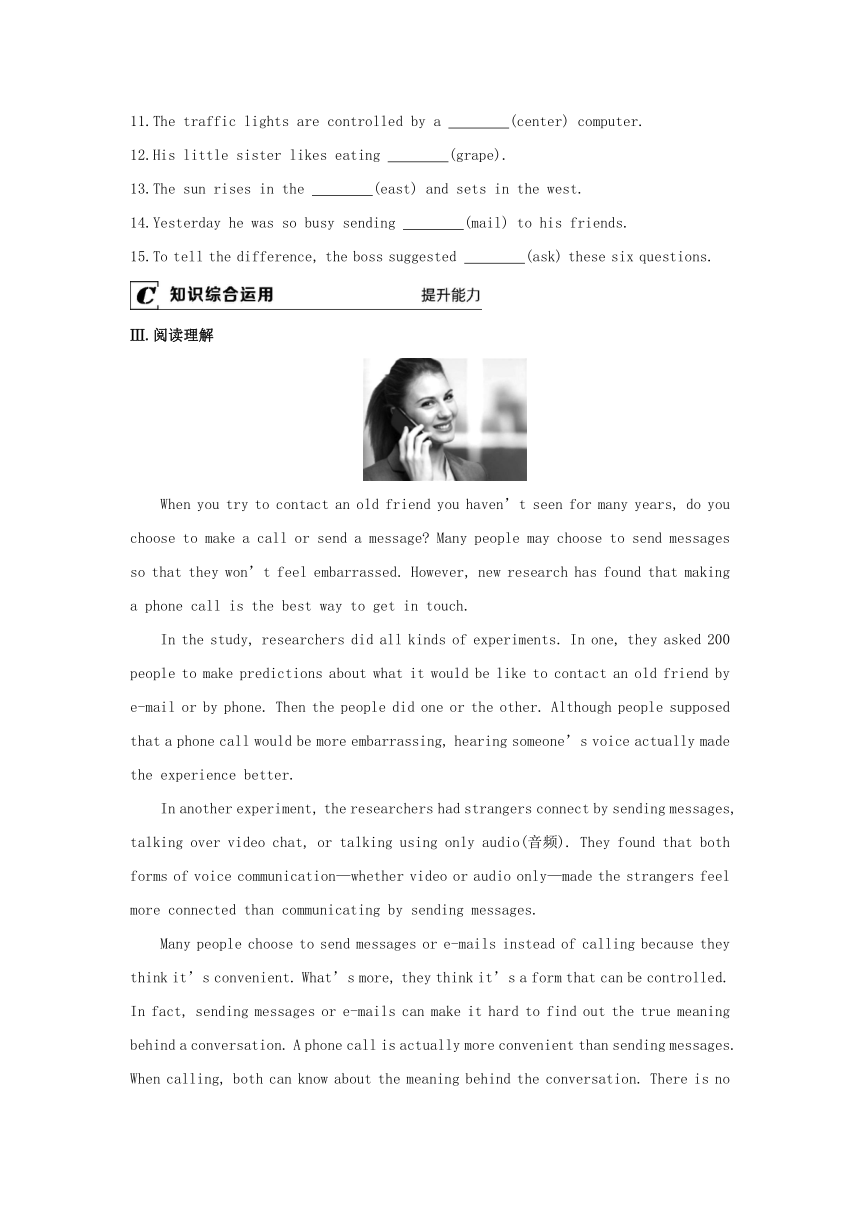人教版九年级全一册Unit 3Could you please tell me where the restrooms are? Section A (Grammar Focus-4c)同步训练(含
文档属性
| 名称 | 人教版九年级全一册Unit 3Could you please tell me where the restrooms are? Section A (Grammar Focus-4c)同步训练(含 |  | |
| 格式 | docx | ||
| 文件大小 | 218.9KB | ||
| 资源类型 | 教案 | ||
| 版本资源 | 人教新目标(Go for it)版 | ||
| 科目 | 英语 | ||
| 更新时间 | 2022-10-19 13:56:42 | ||
图片预览



文档简介
[Unit 3 Section A (Grammar Focus-4c)]
Ⅰ.单项选择
( )1.[2021·达州] —Did you notice in his office
—Yes, he was going over our homework.
A.what Mr. Li was doing B.how was Mr. Li doing
C.how Mr. Li was doing D.what Mr. Li is doing
( )2.[2021·天津] —Do you know to see the Beijing Opera
—Yes, you can go to Mei Lanfang Theater.
A.where can we go B.where we can go
C.when shall we go D.when we can go
( )3.[2021·乐山] —Dad, can you tell me I miss her very much.
—Next week, dear.
A.where my mom will go B.when will my mom come back
C.when my mom will come back D.where will my mom go
( )4.[2021·内江] —Excuse me. Could you tell me
—In half an hour.
A.what time does the plane take off
B.what time the plane will take off
C.what time did the plane take off
D.what time the plane took off
( )5.[2021·安顺] The BBC’s documentary Du Fu: China’s Greatest Poet explains Du’s works have been popular for centuries.
A.when B.whether C.why D.who
( )6.[2021·福建] —Could you tell me
—Throwing off poverty(脱贫).
A.who people often talk about this year
B.what people often talk about this year
C.which do people often talk about this year
D.what do people often talk about this year
( )7.[2021·大庆] The school suggested the students pass on they have learned to their parents.
A.what B.that C.which D.where
( )8.[2021·铜仁] —Could you tell us
—About 400 kilometers.
A.how far it is from Tongren to Guiyang
B.how far is it from Tongren to Guiyang
C.how long it takes to get to Guiyang
D.how long does it take to get to Guiyang
( )9.[2022·青岛] —Could you tell me tomorrow
—It will be sunny.
A.what will the weather be like
B.what the weather will be like
C.when will the weather be sunny
D.when the weather will be sunny
( )10. [2022·呼和浩特] She was so angry at he was doing she walked out without a word.
A. what; that B. that; what
C. what; what D. that; that
Ⅱ.用所给单词的适当形式填空
11.The traffic lights are controlled by a (center) computer.
12.His little sister likes eating (grape).
13.The sun rises in the (east) and sets in the west.
14.Yesterday he was so busy sending (mail) to his friends.
15.To tell the difference, the boss suggested (ask) these six questions.
Ⅲ.阅读理解
When you try to contact an old friend you haven’t seen for many years, do you choose to make a call or send a message Many people may choose to send messages so that they won’t feel embarrassed. However, new research has found that making a phone call is the best way to get in touch.
In the study, researchers did all kinds of experiments. In one, they asked 200 people to make predictions about what it would be like to contact an old friend by e-mail or by phone. Then the people did one or the other. Although people supposed that a phone call would be more embarrassing, hearing someone’s voice actually made the experience better.
In another experiment, the researchers had strangers connect by sending messages, talking over video chat, or talking using only audio(音频). They found that both forms of voice communication—whether video or audio only—made the strangers feel more connected than communicating by sending messages.
Many people choose to send messages or e-mails instead of calling because they think it’s convenient. What’s more, they think it’s a form that can be controlled. In fact, sending messages or e-mails can make it hard to find out the true meaning behind a conversation. A phone call is actually more convenient than sending messages. When calling, both can know about the meaning behind the conversation. There is no need for them to think about the possible meanings behind words.
So if you want to feel more connected to the people you’re talking to, you should call them instead of sending messages.
( )16.Why do many people choose to contact old friends by sending messages
A.To avoid feeling embarrassed.
B.To communicate better.
C.To save more time.
D.To be more convenient.
( )17.What did the 200 people do in the experiment
A.They talked to old friends face to face.
B.They chatted with old friends on the Internet.
C.They called or sent messages to old friends.
D.They talked with old friends by only using audio.
( )18.What do researchers find in the experiments
A.People prefer listening to someone’s voice.
B.Sending messages may make people embarrassed.
C.People feel more connected when getting messages.
D.Sending messages is more convenient than calling.
( )19.What can we know from the fourth paragraph
A.Sending messages is actually more convenient than making calls.
B.It’s hard to know the true meaning behind the conversation by sending messages.
C.Calling is a form that can be controlled.
D.There is no need to send messages.
( )20.What’s the best title of the passage
A.The Reasons You Should Call Instead of Sending Messages
B.The Ways to Send Messages Correctly
C.How You Can Talk with Old Friends on the Phone
D.The Proper Ways to Talk with Old Friends
Ⅳ.词语运用
If you ask people of different countries “Could you tell me the way to the post office ”, you will get 21. (difference) answers.
In Japan, people use landmarks(路标) instead 22. street names. For example, the 23. (Japan) will say to travelers, “Go straight down to the corner. Turn left at a big hotel and 24. (go) past a fruit market. The post office is across 25. the bus stop.”
People in Greece sometimes do not even try to give 26. (direct).They will often say, “Follow me.” Sometimes if a person doesn’t know the answer to your question, he 27. she, like a New Yorker, might say, “Sorry, I have no idea.” But in Yucatan, Mexico, no one answers “I don’t know”.People there think “I don’t know” is 28. (polite). They 29. (normal) give an answer, but often a wrong one. So a visitor can often get 30. (lose) in Yucatan!
教 师 详 解 详 析
[Unit 3 Section A (Grammar Focus-4c)]
Ⅰ.1.A 宾语从句。句意: “你注意到李老师正在办公室里干什么吗 ”“是的,他正在检查我们的作业。”由答语中的“he was going over our homework”可知,上句询问的是“李老师正在干什么”。结合助动词Did可知,宾语从句应用过去进行时。
2.B
3.C 宾语从句。句意: “爸爸, 你能告诉我我妈妈什么时候回来吗 我非常想念她。”“下个星期,亲爱的。”根据答语“Next week”,排除A、D项;在宾语从句中需用陈述语序,排除B项。
4.B 5.C
6.B 宾语从句。句意:“你能告诉我今年人们都在谈论什么吗 ”“脱贫。”根据答语“脱贫”可知,问句应该是问谈论什么,因此宾语从句的引导词要用what,且用陈述语序。
7.A 宾语从句的引导词。句意: 学校建议学生们将自己所学的知识传授给父母。根据句意以及引导词在宾语从句中充当宾语可知选A。
8.A 宾语从句。句意: “你能告诉我从铜仁到贵阳有多远吗 ”“大约400公里。”宾语从句用陈述语序,排除B、D。通过答语可知,是询问距离多远。
9.B
10.A 句意:她对他所做的事情如此生气以至于她一句话也没说就走出去了。第一空引导后面的“he was doing”,构成宾语从句,意为“他所做的事情”,同时引导词在宾语从句中作宾语,故用what来引导;so…that…表示“如此……以至于……”,that引导结果状语从句。
Ⅱ.11.central 12.grapes 13.east 14.mail 15.asking
Ⅲ.【主旨大意】 在联系多年未见的老朋友时,你是选择打电话,还是发信息 很多人为了避免尴尬,会选择发信息。然而,研究发现,打电话才是联络感情的最佳方式。
16.A 细节理解题。由第一段中的“Many people may choose to send messages so that they won’t feel embarrassed.”可知,许多人与多年未见的老朋友联系时发信息是为了避免尴尬。
17.C 细节理解题。根据第二段中的“In one, they asked 200 people to make predictions about what it would be like to contact an old friend by e-mail or by phone. Then the people did one or the other.”可知,这200人在实验中给老朋友打电话或发信息。
18.A 细节理解题。由第二段最后一句“…hearing someone’s voice actually made the experience better.”可知,人们更喜欢听到别人的声音。
19.B 细节理解题。根据第四段中的“In fact, sending messages or e-mails can make it hard to find out the true meaning behind a conversation.”可知,发信息很难了解会话背后真正的含义。
20.A 主旨大意题。通读全文可知,这篇文章主要解释了与老朋友联系时为什么打电话要比发信息好。
Ⅳ.21.different 22.of 23.Japanese 24.go 25.from 26.directions 27.or
28.impolite 29.normally 30.lost
Ⅰ.单项选择
( )1.[2021·达州] —Did you notice in his office
—Yes, he was going over our homework.
A.what Mr. Li was doing B.how was Mr. Li doing
C.how Mr. Li was doing D.what Mr. Li is doing
( )2.[2021·天津] —Do you know to see the Beijing Opera
—Yes, you can go to Mei Lanfang Theater.
A.where can we go B.where we can go
C.when shall we go D.when we can go
( )3.[2021·乐山] —Dad, can you tell me I miss her very much.
—Next week, dear.
A.where my mom will go B.when will my mom come back
C.when my mom will come back D.where will my mom go
( )4.[2021·内江] —Excuse me. Could you tell me
—In half an hour.
A.what time does the plane take off
B.what time the plane will take off
C.what time did the plane take off
D.what time the plane took off
( )5.[2021·安顺] The BBC’s documentary Du Fu: China’s Greatest Poet explains Du’s works have been popular for centuries.
A.when B.whether C.why D.who
( )6.[2021·福建] —Could you tell me
—Throwing off poverty(脱贫).
A.who people often talk about this year
B.what people often talk about this year
C.which do people often talk about this year
D.what do people often talk about this year
( )7.[2021·大庆] The school suggested the students pass on they have learned to their parents.
A.what B.that C.which D.where
( )8.[2021·铜仁] —Could you tell us
—About 400 kilometers.
A.how far it is from Tongren to Guiyang
B.how far is it from Tongren to Guiyang
C.how long it takes to get to Guiyang
D.how long does it take to get to Guiyang
( )9.[2022·青岛] —Could you tell me tomorrow
—It will be sunny.
A.what will the weather be like
B.what the weather will be like
C.when will the weather be sunny
D.when the weather will be sunny
( )10. [2022·呼和浩特] She was so angry at he was doing she walked out without a word.
A. what; that B. that; what
C. what; what D. that; that
Ⅱ.用所给单词的适当形式填空
11.The traffic lights are controlled by a (center) computer.
12.His little sister likes eating (grape).
13.The sun rises in the (east) and sets in the west.
14.Yesterday he was so busy sending (mail) to his friends.
15.To tell the difference, the boss suggested (ask) these six questions.
Ⅲ.阅读理解
When you try to contact an old friend you haven’t seen for many years, do you choose to make a call or send a message Many people may choose to send messages so that they won’t feel embarrassed. However, new research has found that making a phone call is the best way to get in touch.
In the study, researchers did all kinds of experiments. In one, they asked 200 people to make predictions about what it would be like to contact an old friend by e-mail or by phone. Then the people did one or the other. Although people supposed that a phone call would be more embarrassing, hearing someone’s voice actually made the experience better.
In another experiment, the researchers had strangers connect by sending messages, talking over video chat, or talking using only audio(音频). They found that both forms of voice communication—whether video or audio only—made the strangers feel more connected than communicating by sending messages.
Many people choose to send messages or e-mails instead of calling because they think it’s convenient. What’s more, they think it’s a form that can be controlled. In fact, sending messages or e-mails can make it hard to find out the true meaning behind a conversation. A phone call is actually more convenient than sending messages. When calling, both can know about the meaning behind the conversation. There is no need for them to think about the possible meanings behind words.
So if you want to feel more connected to the people you’re talking to, you should call them instead of sending messages.
( )16.Why do many people choose to contact old friends by sending messages
A.To avoid feeling embarrassed.
B.To communicate better.
C.To save more time.
D.To be more convenient.
( )17.What did the 200 people do in the experiment
A.They talked to old friends face to face.
B.They chatted with old friends on the Internet.
C.They called or sent messages to old friends.
D.They talked with old friends by only using audio.
( )18.What do researchers find in the experiments
A.People prefer listening to someone’s voice.
B.Sending messages may make people embarrassed.
C.People feel more connected when getting messages.
D.Sending messages is more convenient than calling.
( )19.What can we know from the fourth paragraph
A.Sending messages is actually more convenient than making calls.
B.It’s hard to know the true meaning behind the conversation by sending messages.
C.Calling is a form that can be controlled.
D.There is no need to send messages.
( )20.What’s the best title of the passage
A.The Reasons You Should Call Instead of Sending Messages
B.The Ways to Send Messages Correctly
C.How You Can Talk with Old Friends on the Phone
D.The Proper Ways to Talk with Old Friends
Ⅳ.词语运用
If you ask people of different countries “Could you tell me the way to the post office ”, you will get 21. (difference) answers.
In Japan, people use landmarks(路标) instead 22. street names. For example, the 23. (Japan) will say to travelers, “Go straight down to the corner. Turn left at a big hotel and 24. (go) past a fruit market. The post office is across 25. the bus stop.”
People in Greece sometimes do not even try to give 26. (direct).They will often say, “Follow me.” Sometimes if a person doesn’t know the answer to your question, he 27. she, like a New Yorker, might say, “Sorry, I have no idea.” But in Yucatan, Mexico, no one answers “I don’t know”.People there think “I don’t know” is 28. (polite). They 29. (normal) give an answer, but often a wrong one. So a visitor can often get 30. (lose) in Yucatan!
教 师 详 解 详 析
[Unit 3 Section A (Grammar Focus-4c)]
Ⅰ.1.A 宾语从句。句意: “你注意到李老师正在办公室里干什么吗 ”“是的,他正在检查我们的作业。”由答语中的“he was going over our homework”可知,上句询问的是“李老师正在干什么”。结合助动词Did可知,宾语从句应用过去进行时。
2.B
3.C 宾语从句。句意: “爸爸, 你能告诉我我妈妈什么时候回来吗 我非常想念她。”“下个星期,亲爱的。”根据答语“Next week”,排除A、D项;在宾语从句中需用陈述语序,排除B项。
4.B 5.C
6.B 宾语从句。句意:“你能告诉我今年人们都在谈论什么吗 ”“脱贫。”根据答语“脱贫”可知,问句应该是问谈论什么,因此宾语从句的引导词要用what,且用陈述语序。
7.A 宾语从句的引导词。句意: 学校建议学生们将自己所学的知识传授给父母。根据句意以及引导词在宾语从句中充当宾语可知选A。
8.A 宾语从句。句意: “你能告诉我从铜仁到贵阳有多远吗 ”“大约400公里。”宾语从句用陈述语序,排除B、D。通过答语可知,是询问距离多远。
9.B
10.A 句意:她对他所做的事情如此生气以至于她一句话也没说就走出去了。第一空引导后面的“he was doing”,构成宾语从句,意为“他所做的事情”,同时引导词在宾语从句中作宾语,故用what来引导;so…that…表示“如此……以至于……”,that引导结果状语从句。
Ⅱ.11.central 12.grapes 13.east 14.mail 15.asking
Ⅲ.【主旨大意】 在联系多年未见的老朋友时,你是选择打电话,还是发信息 很多人为了避免尴尬,会选择发信息。然而,研究发现,打电话才是联络感情的最佳方式。
16.A 细节理解题。由第一段中的“Many people may choose to send messages so that they won’t feel embarrassed.”可知,许多人与多年未见的老朋友联系时发信息是为了避免尴尬。
17.C 细节理解题。根据第二段中的“In one, they asked 200 people to make predictions about what it would be like to contact an old friend by e-mail or by phone. Then the people did one or the other.”可知,这200人在实验中给老朋友打电话或发信息。
18.A 细节理解题。由第二段最后一句“…hearing someone’s voice actually made the experience better.”可知,人们更喜欢听到别人的声音。
19.B 细节理解题。根据第四段中的“In fact, sending messages or e-mails can make it hard to find out the true meaning behind a conversation.”可知,发信息很难了解会话背后真正的含义。
20.A 主旨大意题。通读全文可知,这篇文章主要解释了与老朋友联系时为什么打电话要比发信息好。
Ⅳ.21.different 22.of 23.Japanese 24.go 25.from 26.directions 27.or
28.impolite 29.normally 30.lost
同课章节目录
- Unit 1 How can we become good learners.
- Section A
- Section B
- Unit 2 I think that mooncakes are delicious!
- Section A
- Section B
- Unit 3 Could you please tell me where the restroom
- Section A
- Section B
- Unit 4 I used to be afraid of the dark.
- Section A
- Section B
- Unit 5 What are the shirts made of?
- Section A
- Section B
- Review of Units 1-5
- Unit 6 When was it invented?
- Section A
- Section B
- Unit 7 Teenagers should be allowed to choose their
- Section A
- Section B
- Unit 8 It must belong to Carla.
- Section A
- Section B
- Unit 9 I like music that I can dance to.
- Section A
- Section B
- Unit 10 You're supposed to shake hands.
- Section A
- Section B
- Review of Units 6-10
- Unit 11 Sad movies make me cry.
- Section A
- Section B
- Unit 12 Life is full of the unexpected
- Section A
- Section B
- Unit 13 We're trying to save the earth!
- Section A
- Section B
- Unit 14 I remember meeting all of you in Grade 7.
- Section A
- Section B
- Review of Units 11-14
